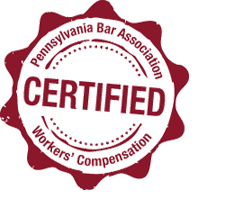|
|
|
Main Office: Philadelphia, PA (215) 656-3600 Toll Free: (800) 631-1233 |
|
|
Workers' Compensation Alert
September 2016 – Willig, Williams & Davidson |
|
|
|
| Understanding Workers' Compensation
No one plans to get injured while on the job, but when injuries do occur, workers need an advocate who can steer them through what can seem like a complex legal system. The Willig, Williams & Davidson workers' compensation attorneys utilize the firm's wide-ranging union-side practice to help further the cause of providing safe working conditions and fair benefits for injured workers.
Unlike some other firms, our attorneys are uniquely suited to understand the complex interplay between workers' compensation law and other employment rights, such as union benefits, the Family and Medical Leave Act (FMLA), Act 534, and the Heart & Lung Act. Our attorneys use that knowledge to look beyond the workers' compensation law and make sure that our clients' rights are fully protected. Learn more about how Willig, Williams & Davidson's worker's compensation attorneys can help you by
clicking here.
|
 When and How to Report a Work-Related Injury When and How to Report a Work-Related Injury
If you are injured on the job, your first instinct might be to push through or otherwise try to conceal your injury. While everyone, even non-laborers such as office workers, may experience bumps and bruises during the course of their work, significant injuries demand immediate attention - both for your physical well-being and to ensure your financial security through workers' compensation benefits.
When it comes to reporting a work-related injury, there are proper procedures to follow and important timing considerations for both employers and employees.
Read more about Reporting a Work-Related Injury...
|
 Philadelphia Workers' Comp Attorney Discusses Types of Injuries Covered by PA Workers' Compensation Philadelphia Workers' Comp Attorney Discusses Types of Injuries Covered by PA Workers' Compensation
Our workers' comp attorney Marianne Henry Saylor reviews the injuries covered by Pennsylvania workers' compensation as they relate to activities involved in work environments such as “slip and fall” or accidents.
|
|
|
|
|
|
Copyright © 2016 Willig, Williams & Davidson.
Willig, Williams & Davidson is one of the largest and most respected union-side labor law firms in the United States with offices in Philadelphia, Harrisburg, Jenkintown and Media, Pa., as well as Haddonfield, N.J. The firm's accomplished and diverse legal team focuses on representing labor unions, employee benefit funds and individual working people and their families. Its attorneys work with clients to find practical and efficient solutions to the problems that they face in a variety of legal forums, including national, regional and local contract negotiations and dispute resolution through mediation, arbitration and court litigation. The materials contained in this correspondence have been authored or gathered by Willig, Williams & Davidson for informational purposes only. This correspondence is not intended to be and is not considered to be legal advice. Transmission of this document is not intended to create, and receipt does not establish, an attorney-client relationship. Legal advice of any nature should be sought from legal counsel. In some states, this correspondence may be considered attorney advertising. |
|
|